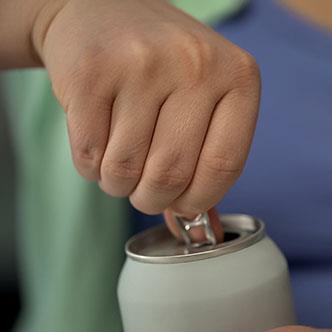
Drinking two or more diet drinks a day may increase risk of stroke, heart disease and death, based on a study of nearly 82,000 middle-aged and older U.S. women. Results were recently published in the American Heart Association journal Stroke and add to concerns of artificially sweetened beverages and their impact on public health.
Known as the Women’s Health Initiative Observational Study, this study tracked the health of 81,714 postmenopausal women in the United States. Women enrolled between 1993 and 1998 and completed ongoing medical exams and surveys about their diet, health and lifestyle throughout the study. They were followed for an average of 12 years, with researchers tracking key outcomes like stroke, heart disease and death.
The goal of the recent analysis was to explore the link between diet drink consumption and heart-health outcomes. Many studies have linked sugar-sweetened beverages to increased risk for diabetes and heart disease. However, findings on the negative health effects of artificially sweetened beverages are less clear.
In the recent study, most participants never or rarely consumed diet drinks with 64% reported drinking less than one diet drink a week. Only 5% regularly consumed diet drinks (two or more a day) and the rest of participants fell somewhere in between.
Study participants were between 50 and 79 years old and free of heart disease at the start of the study.
After more than a decade of follow-up, researchers found that frequent diet drinkers had 23% greater risk for stroke, 29% greater risk for heart disease and 16% greater risk of death compared to rare drinkers. Researchers also found that among obese women, regular diet drinkers had two-fold greater risk for ischemic stroke than those who rarely or never drank diet drinks.
Ischemic stroke is the most common type of stroke that occurs when blood flow to the brain is blocked.
What the study confirms, according to authors, is that frequent diet drink consumption may be linked to increased heart risks. In this study, frequent consumption was defined as two or more diet drinks a day and included any artificially sweetened drinks, such as diet soda or diet juice drinks.
Of course, it’s important to note that this study doesn’t prove that diet drink consumption directly increased risk for stroke and heart disease. Researchers did account for factors that can influence outcomes, such as age, gender, physical activity and weight. However, data on beverage consumption was self-reported, and the design of the study doesn’t prove cause and effect. Participants were also female, so findings can’t be generalized to a more diverse population.
Still, this is not the first study to link artificially sweetened beverages to increased health risks. According to experts, it’s safest to limit consumption of any type of sweetened beverage, whether sweetened with sugar or zero-calorie sweeteners. When in doubt, try to opt for water when possible, which is always the best beverage choice when it comes to health.